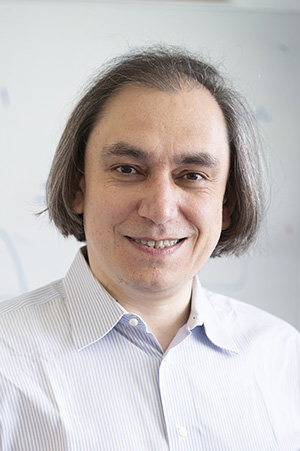Prof. Evgenii Narimanov chosen for new Virtual Labs Faculty Fellows program

Virtual labs have been gaining ground in the College of Engineering. By combining mixed reality technologies with physics-based modeling and simulation and authentic machine interfaces, virtual labs are enriching learning. To expand the reach of this innovative instructional approach, the College has launched the Virtual Labs Faculty Fellows program, and has selected and engaged the first cohort of fellows.
Evgenii Narimanov, professor of electrical and computer engineering, is among the 10 inaugural fellows who have embarked on a six-week virtual lab development program this summer. Weekly workshops focus on evidence-based practices and activities to design, develop and implement virtual labs content.
Each fellow has received $10,000 in discretionary funding. College experts are teaching the workshops, supported by specialists from Purdue’s Envision Center, which will produce the virtual labs, and Center for Instructional Excellence (CIE). The new virtual labs, each of which will complement or replace one or two weeks of lab activities in a course, are expected to be deployed by the 2022-2023 academic year.
Narimanov will teach ECE 604: Electromagnetic Field Theory. The virtual lab will demonstrate how different materials respond to electric fields and currents in different device geometries, showing the evolution from the simple dielectric polarization that can partially suppress the external field to weak screening in intrinsic semiconductors, to strong screening in heavily doped conducting materials, to the nearly “ideal conductor” regime of high-quality metals at low frequencies. Students will explore the electric field and potential energy landscape in a broad range of practically relevant systems.
“We are excited about the continued growth and adoption of virtual labs within the Purdue Engineering curriculum,” said Michael D. Sangid, Elmer F. Bruhn Associate Professor of Aeronautics and Astronautics, Professor of Materials Engineering, and Dean’s Fellow for Virtual Labs. “The faculty are exploring endless possibilities for the delivery of educational material through virtual labs, which provide opportunities to transcend the constraints of physical labs.” Sangid initiated and is leading the virtual lab summer development program.
Sangid added: “Purdue already is at the cutting edge of virtual labs. We created the Faculty Fellows program to help us attain our vision of becoming the international leader in virtual labs for education, and are the first university to widely adopt and deploy virtual labs across its entire engineering curriculum.”
“Improvements and standardization of web-deployed 3D content and related production tools over the last decade have allowed the Envision Center to take educational and research content into much broader and accessible platforms,” said George Takahashi, lead visualization scientist at the Envision Center, who is leading development and production aspects of virtual labs. “These experiential learning platforms supplement or even enhance traditional labs through advanced visualization, computation, and intuitive interaction. Making this content available online enables students to learn at their own pace while alleviating logistical constraints with physical spaces and equipment.”
“Engaging with virtual labs allows students to develop skills, including procedural and visualization skills, critical thinking, and metacognition, at scale without restrictions on time, space and materials,” said Erica Lott, senior instructional developer for the CIE, who is leading educational aspects. “Faculty can use virtual labs in and outside of the classroom to convey tangible and abstract concepts, identify and address alternate conceptions, and work on discipline-specific skill development in order to provide students the opportunity to develop a deeper understanding of the content and its application.”
Source: 10 Virtual Labs Faculty Fellows selected to develop new interactive learning opportunities
